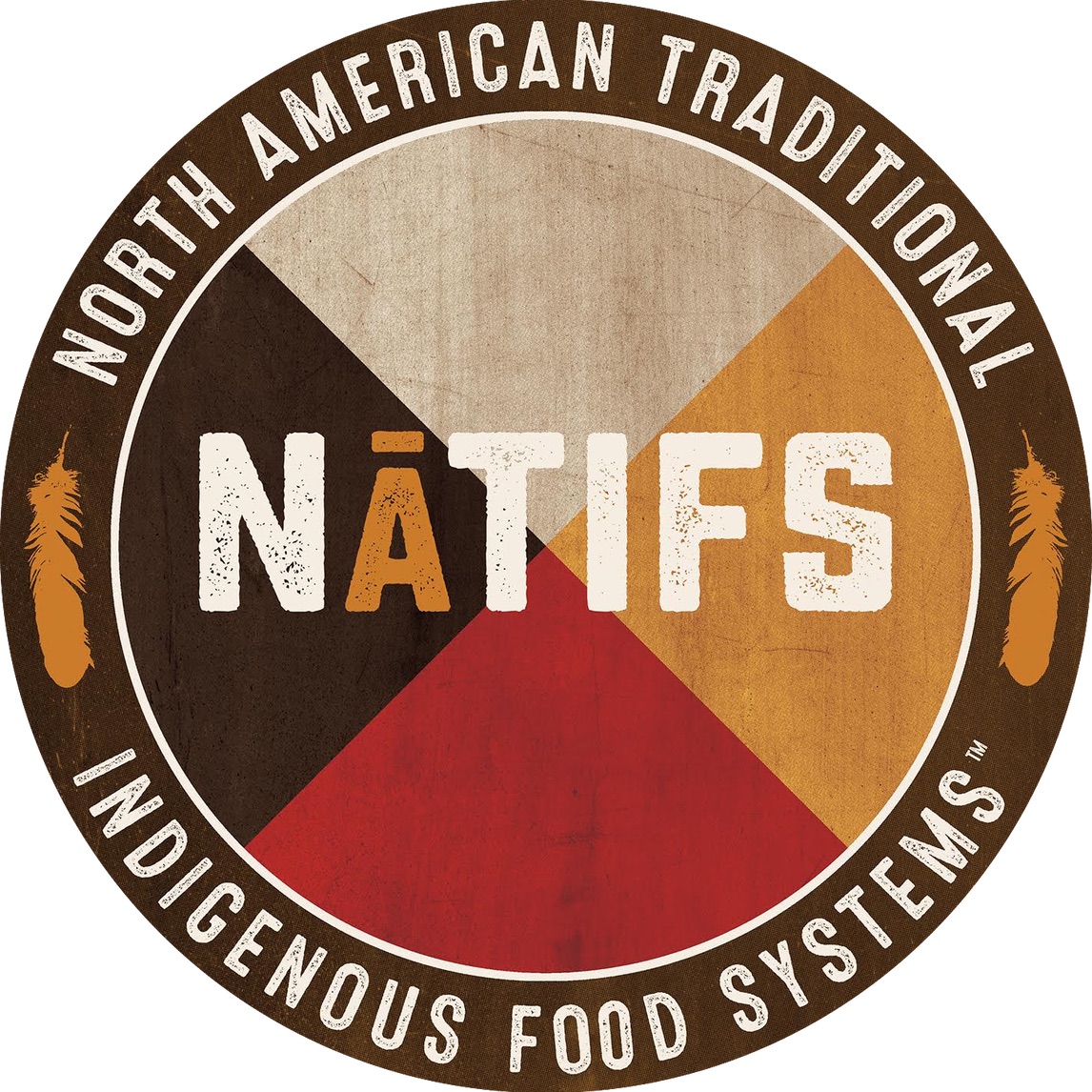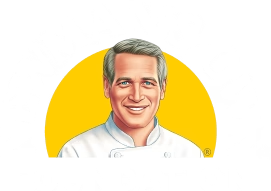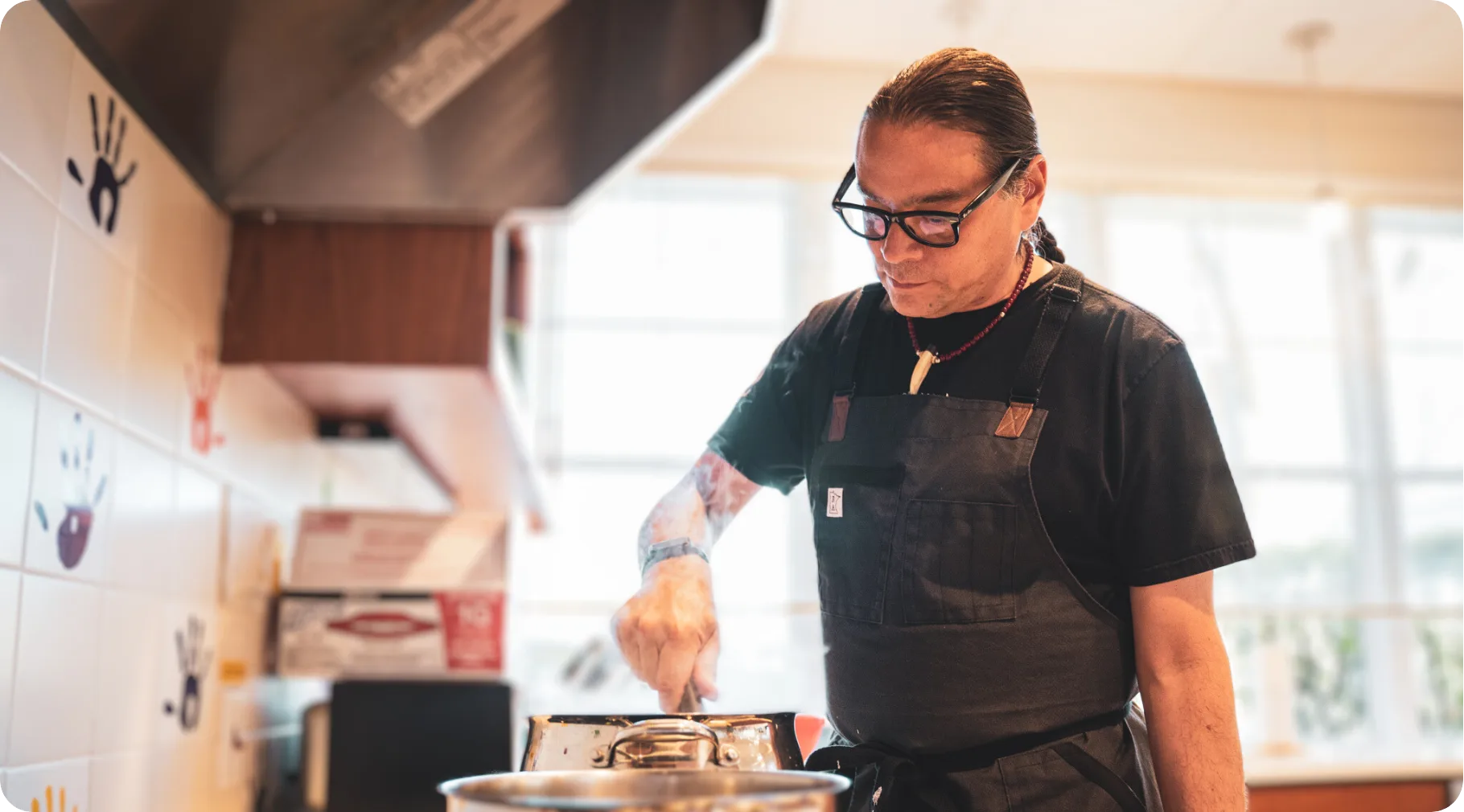“A lot of the work is not only creating food access, but also creating the education around it: creating recipes, creating menus, and showcasing what it takes to be able to pull those off and creating training programs and development programs for that. A big part of food justice is making sure that there are equitable systems for kids to have access to healthy foods and culturally relevant foods and understanding that Indian country isn’t one unit, but a vast network and tapestry of many different cultures out there.”
Sean Sherman
Founder, NATIFS
Why does a James Beard-award winning chef and restaurateur develop recipes for school lunches? Why does one of TIME’s 100 most influential people in the world focus on counter service eateries? It’s all part of chef Sean Sherman’s plan to revitalize Indigenous food pathways, restore Indigenous food sovereignty, and bring Indigenous products and culinary practices to the mainstream to address the economic and health crises affecting Native communities.Sherman’s Owamni by the Sioux Chef restaurant in Minneapolis was declared the best restaurant in America by The New Yorker in 2022. This is where he creates tasting menus made from only decolonized, Indigenous North American ingredients like smoked bison loin, trout roe tostadas with caramelized kabocha squash jam, and sweet potato and cassava flour doughnuts, dusted with maple syrup powder. But Sherman, a member of the Oglala Lakota Sioux tribe, also creates equally delicious meals for Indigenous schools and families through founding the nonprofit North American Traditional Food Systems (NATIFS). NATIFS has been a Newman’s Own Foundation grantee partner since 2021.
As part of a partnership with the Red Cloud Indian School on the Pine Ridge Reservation in South Dakota, NATIFS has developed recipes for its school lunch program, as well as sponsoring half the cost of some high-priority kitchen equipment. The students (K-5) participate and the parents are invited to join for the meal on Culture Wednesdays, while also receiving the same recipes adapted for a home kitchen. The ingredients are 100% decolonized, meaning there’s no flour, white sugar, dairy, pork, or chicken, but they are flexible. “We help them source ingredients, but we keep in mind accessibility,” says Linda Black Elk, education director at NATIFS. “They may not always be able to get a hold of lotus root, so they can use purple potatoes instead.” NATIFS has also created a food demo with meal kits, for example, bison on corn tortillas, to take into other Indigenous middle schools. The students watch the preparation, eat the food, and then each take a kit to cook at home.
NATIFS makes a point of sourcing from Indigenous producers in order to restore the traditional trade routes that once allowed landlocked tribes access to the coasts and other regions. “It’s important to honor trade from all over Turtle Island and not just Minnesota,” says Black Elk. This means NATIFS is sourcing tepary beans from Ramona Farms in Arizona and maple syrup from Ojibwe and Oneida tribes, and even kelp pickles from a partly native-owned company in Alaska. Meanwhile NATIFS’ Indigenous Food Lab (IFL) market and kitchen in the Midtown Global Market in Minneapolis serves a menu of corn tortilla and grain bowls topped with smoked turkey, bison birria, or the three sisters (beans, corn, and squash). The IFL is also a training and education center and retail space, as well as a counter service restaurant, where school groups and students receive hands-on education about food sovereignty and medicinal ingredients.
They get school groups from Minnesota and some from North Dakota and Wisconsin. “We expose the kids to not just the ingredients, like nettles for example, but where you find them, how you sustainably harvest them, if you can use them in food or tea, and how to preserve and store them,” explains Black Elk.
This model has proven so successful that NATIFS plans to expand to a second location in Bozeman, Montana, in partnership with the Piikani Lodge Health Institute, Buffalo Nations Food Systems Initiative, and other local and regional partners. It will host in-person events, classes, and quarterly pop-up dinners.
Additionally NATIFS is designing an open-source lesson plan database for teachers with accompanying videos for all the schools that can’t bring their students to the Twin Cities or Bozeman.What you can do
Donate to NATIFS here, watch Sean’s TED talk to learn more here, or visit NATIFS Indigenous Food Lab the next time you’re in Minneapolis!


